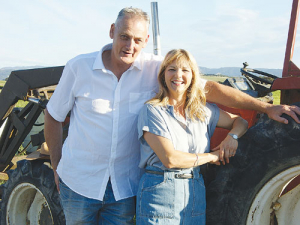The speciality cheese firm run by Richard and Helen Dorresteyn has won seven other awards this year including the top artesan award in the NZ Cheese Awards and Peoples Choice award for the Clevedon Farmers Market which they own and run.
Helen says they have worked long and hard to get to this point.
“After 12 years graft with the [Clevedon] Farmers Market and 10 with the buffalos we are feeling good about things,” Helen told Dairy News.
The Dorresteyn’s were the first NZers to commercially farm buffalo. Today they milk 150 Riverine water buffalo and make mozzarella, bocconcini, yoghurt, marinated cheese and ricotta, available at specialty food stores across NZ. Their Clevedon marinated buffalo cheese won the producer title.
While Clevedon Buffalo has won awards all the way through, Helen says genetically their herd can now produce enough milk to supply demand.
Until a couple of years ago Helen was the sole sales person, retail and food service, plus running the business with Richard who runs the farm and makes the cheese.
Having enough milk to supply demand is a breakthrough for the business.
“You can’t just dial up another tanker of buffalo milk. We’ve had to bring our herd in, learn how to farm them and breed them to the point they are producing a good volume of milk per head.
“You don’t just go and buy your buffalo milk off the shelf and have a ready-made success story. It doesn’t work like that.”
When they first milked their buffalo they were getting 3L/day which is double the solids, or 6L equivalent of cows’ milk. Now they are averaging 7L/day and working towards 9L/day which is the equivalent of 18L of solids in cow milk terms.
“You can put exactly the same amount of feed into an animal but if the genetics aren’t there you will not get the same amount of milk.
“We’ve had to improve our herd [genetics with AI], and we have always done well with our product because my husband is good at what he does.
“But we’ve not had the volume of milk until now to really push it out to meet demand.”
Building the dairy factory, the herd and brand has demanded their personal investment of time and money.
Helen says now they are producing enough milk they can employ staff, spend a little on packaging and do some of the “nice stuff you can’t take for granted when you are paying the bills”.
They have imported semen from Italy and had good technicians all the way through. They AI on the buffalo cycle which is every 35 days, then run the bulls.
“We calve right through the year but try to weight the herd to the summer months when everyone is eating out. But generally we are producing throughout the year.”
Buffalo take some care. They are not nasty but have horns, they make a wallow in every paddock and troughs have to be designed so they don’t jump in and break the ballcocks. Bulls must be kept separate as they can kill each other. Buffalo don’t like the cold and also need care in the sun.
Helen says she is terribly fond of them, especially the hand-raised ones. With calving throughout the year she generally has one at home.
“The big girls are very affectionate. They will come over to us at the fence line; they want to know you, they want to lick you or they are just curious.
“Like any animals they all have personalities. Anything nasty is long gone from the herd.”
“As in the early days of developing a Friesian herd [the questions are] how much milk do they produce? how often do they throw a calf? how well do they calve? and what’s their temperament?
“All the things you are looking for in a dairy cow you are looking for in a dairy buffalo.”
Be the best or be toast
People think buffalo is a get-rich-quick scheme because the products are expensive in the shops, says Helen Dorresteyn.
“You’ve got a lot of investment up front, you’ve got to find the market, get good animals, learn how to make the cheese.”
In making a premium product, during the first two to three years they discarded product that didn’t reach their own high standards.
Buffalo cheese is best eaten fresh; snap frozen is nothing like the fresh product they produce, she says.
“But in the marketplace there is a perception that a cheese from Europe is much better than a cheese from New Zealand, which is absolute rubbish.
“So you’ve got to dispel that one, and educate people to eat fresh product.”
“Like any business you’ve got work hard, be prepared to invest and you’ve got to be your own quality controller.
“You can’t put something out that is only just good enough. You only get one chance to put your cheese in front of a chef and in the world of buffalo mozzarella it must be even better than what comes from overseas. Otherwise you’re history, you’re toast.”









